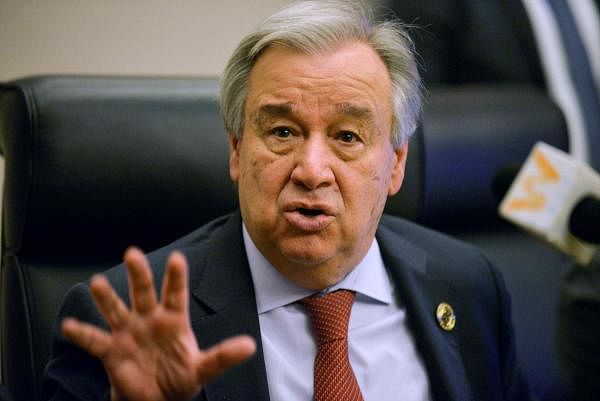
Secretary-General Antonio Guterres took the Saudi-led coalition backing Yemen's government off a global list of parties whose actions have harmed children in conflict, a move that drew immediate protests Monday from human rights groups.
The UN chief's annual report to the Security Council on Children and Armed Conflict released on Monday removed the coalition from a relatively new list of government forces and armed groups “that have put in place measures ... aimed at improving the protection of children.”
The Saudi-led, US-backed coalition supporting Yemen's internationally recognised government is battling Houthi Shiite rebels and their allies. The Houthis have held Yemen's capital, Sanaa, since September 2014, and their advance across the Arab world's poorest country brought the Saudi-led coalition into the war in March 2015.
Virginia Gamba, the UN special representative for children in armed conflict, told a news conference launching the report that the secretary-general made the decision to remove the Saudis from the "blacklist" following “the sustained, significant decrease in killing and maiming due to airstrikes."
Gamba noted that about five years ago there were about 1,700 child casualties in Yemen due to airstrikes, compared to 171 last year. She stressed that with casualties continuing, UN monitoring of a memorandum with the Saudis on ending child deaths and injuries will continue, and failure to implement it could put Saudi Arabia back on the list next year.
Jo Becker, Human Rights Watch's children's rights advocacy director, accused the secretary-general of adding a new level of shame to his 'list of shame' by removing the Saudi-led coalition and ignoring the UN's own evidence of continued grave violations against children.”
Adrianne Lapar, director of Watchlist on Children and Armed Conflict, an international advocacy group, said that by removing the Saudi-led coalition, which also includes the United Arab Emirates, “the Secretary-General sends the message that powerful actors can get away with killing children.”
She called for an independent and transparent assessment of the process of delisting the coalition, “to ensure that all violators are held to the same standard, no matter who they or their friends are.”
Gamba replied in response to a question on whether Saudi Arabia offered the UN any incentives to get off the list, “absolutely not.”
In 2016, then secretary-general Ban Ki-moon removed the Saudi-led coalition from the “blacklist” of government forces that committed grave violations against children the previous year following a vehement protest from Saudi Arabia.
Guterres has added a new list of government forces and armed groups that have taken measures to improve the situation of children, which the Saudis were put on.
The Houthis remain on the UN “list of shame” for failing to put in place measures to improve the protection of children though secretary-general Guterres said in the report that he is encouraged by ongoing UN talks with the rebel group “to end and prevent violations for which they are listed.”